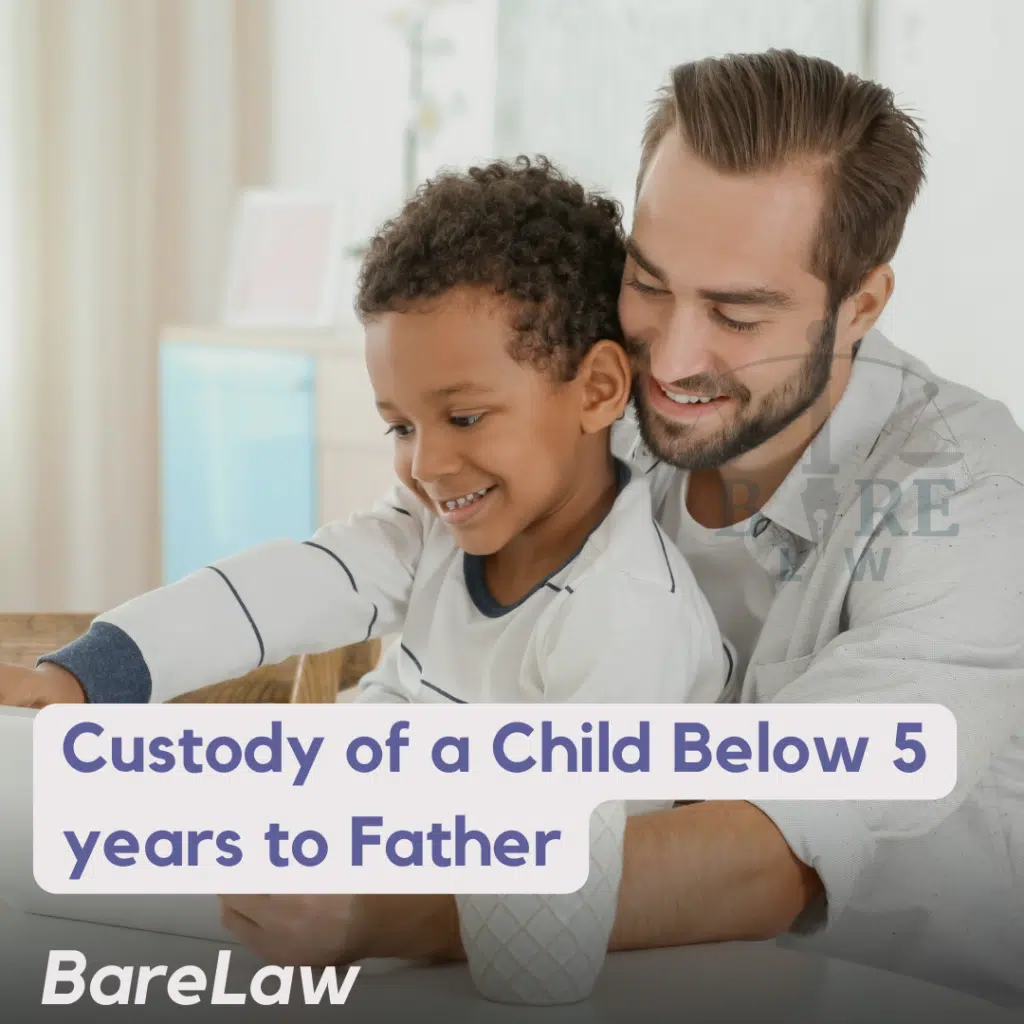
Custody of a Child Below 5 years to Father
Authored By: Karan Gautam
Introduction
Under Hindu Law, custody of a child determines the rights bestowed upon the appointed guardians to control supervision of the matters of youth care, education and welfare. The Hindu law, mainly, is based on the ancient Hindu texts and has been codified in the modern legislation, such as the Hindu Minority and Guardianship Act of 1956.
Custody arrangements in Hindu law can be broadly categorized into two types:
- Natural Guardianship: A Hindu by birth goes by the law that names the father as the natural guardian until the child turns 18. However, in case a mother has any guardianship rights over her minor children, that is a natural right. The father’s authority as the natural guardian includes the right to make decisions concerning the child’s education, religion, health, and other crucial matters. In instances where the father is not present or the father is unable to thereby act as a guardian, the mother then takes over this responsibility.
- Guardianship by Appointment: The natural guardians may not be in a position to act or they can be neglectful or there might be custody disputes which would compel the court to appoint a guardian. This guardian can be a relative or another suitable person whom the court has chosen to be the child’s guardian. The Parliament starts from this point to adopt the child’s good and better interests.
Divorces and separation usually trigger the court decision making with the status of the child in mind. Such criteria as child welfare, parents’ readiness and emotional balance, and the agreements the parties made are usually taken into account by the authorities. One must bear in mind that the custody laws may vary from one case to another and thus it would be wise to seek the advice of a legal expert who specializes in Hindu family law for a more personalized guidance.When the father faces a child custody issue, however, the child is at a tender age of less than five years, it can be extremely difficult. Nevertheless, the Hindu Minority and Guardianship Act of 1956 says, by the way, both parents are naturally accredited guardians. Nevertheless, in cases of custody of a child under five years old, the mother usually has more options than the father. However, section 6(a) of the Hindu Minority and Guardianship Act says that a girl (who is not higher than five years old) suppose to be under the mother’s guardianship.
Section 6(a) of the Hindu Minority and Guardianship Act of 1956
The Hindu Minority and Guardianship Act, 1956 addresses a minor Hindu boy’s or girl’s natural guardianship under section 6(a).
According to Section 6(a):
“The natural guardians of a Hindu minor, in respect of the minor’s person as well as in respect of the minor’s property (excluding his or her undivided interest in joint family property), are:”The natural guardians of a Hindu minor, in respect of the minor’s person as well as in respect of the minor’s property (excluding his or her undivided interest in joint family property), are:
(a) the mother and the father [the father when the baby is a boy or an unmarried girl] turn to be the foster parents; even the mother does not leave the child who has not yet reached his/her “Cutting the line”: an analysis of marital ties in Chinua Achebe’s Things Fall Apart
The end of this part of the Hindu succession suggests that a minor Hindu boy or an unmarried Hindu girl are second class citizens when it comes to the principle of succession. In the beginning, the father is the natural guardian, while after the mother is recognized. Nevertheless, in regard to a young child aged five or less years, which is in the ordinary place for the minor child to be under the mother’s custody. Under this arrangement, the mother’s care of the very young child will be predominant until they turn five giving her the chance to assert her position even in the father’s stand-in role as the custodian from five years hence.
Nevertheless, since Section 6 (a) specifies that custody shall usually belong to the mother, it implies that the rule is flexible. The uncontested mistake is a wrong presumption that the mother is always to be accorded with the full custody of the child under five years old amidst every situation. Therefore, the court must do what it can to protect the children’s welfare if it decides to award a custody right. In the case of the custody of a child by two naturals guardians, the child’s well being is the most important factor to consider.
Child Welfare
The issue of child guardianship is challenging and intricate. On the other hand, if the child is less than five, the statute says that the mother is preferred. The absence of strict guardianship laws places a duty on the court to handle this delicate situation in light of the child’s best interests. The Supreme Court ruled in Nil Ratan Kundu and others vs. Abhijit Kundu, that
The point is that selective care is stimulating. However, on the other hand, if the child is less than five, the statute says that the mother should be the one to take him/her or him/her. The nonexistence of strict guardianship rules made the court to solve this complicated issue in line with the child’s best interests. The court placed its verdict in the case of Nil Ratan Kundu and Others vs. Abhijit Kundu, [2] that
The main question to consider here is what is best for the minor. The riskiest assumption would be to select a guardian without considering the welfare and well-being of the minor. The court is using its parens patriae jurisdiction to appoint a guardian and it is expected—actually, required—to look at the child’s regular comfort, satisfaction, health, education, intellectual growth, and favorable environment.
It is a humanitarian matter in the event of one guardian surrendering to the trustee a kid in his/her custody. Overall one should turn to human judgment during the time of such decision taking rather than to strict legal precedents. The father will become the child’s guardian if the court decides that he is the most suited person for the job to make sure the child is well taken care of. Maturity of the situation is incumbent upon the fact that the child’s age is not the prime occasion.
In the judgment of Tejaswini Gaud and others case (2016), would this revocation of the right to privacy mean that citizens will be denied the technology to monitor their health and well-being? Shekhar Jagdish Prasad Tewari and others[3] , the Supreme Court validated this viewpoint again. And in their opinion, “A court cannot take a pedantic approach in such child’s well-being issues, and every case claimed must be determined according to the real facts and circumstances”.
If the father is able to show the judge what a healthy child he has, he is likely to be granted custody of his child less than five years of age. The proposal of Section 6(a) does not prevent the child’s guardian from taking over the child.
Welfare comprises:
- innate fondness and love
- Comfort on a social, moral, and physical level
- Education, health, and intellectual growth
The court should pay attention to the child’s desire if he has grown up to the point where he can make an informed choice or judgment.
Who makes the welfare decisions?
This last instance positions the court towards the child’s welfare or well-being as the ultimate jurisdiction. The court picks a suitable guardianship and at the same time exercising its parens patriae[4]power. On that account, in addition to the decision, the court will be somewhat more careful or wary. While pediatricians should consider internal factors contributing to the overall happiness and development of the child, the societal factors that may pose hindrance to their childhood should also be taken into account.
The court is not bound by the constitutional restrictions, the strict rules of evidence and procedure, or the established precedents for the resolution of the guardianship disputes. Parens, being a figurehead who acts on behalf of the child, occupies the mantle of the parent. The one who is the centre of the dispute and does not have fully rights and responsibilities but is a victim of irony is the child whose guardianship is taken under the guardianship of those in formal administrative bodies.
Reasons for granting custody to a father
- Infidelity in marriage
If a woman is no longer able to trust husband, the woman becomes unworthy of the custody of the child. Her baby won’t get anything to relieve her from her infidelity or womanizing behavior towards her lover. One of two things could happen: hence, either the mother or the child break their emotional bond. The child whose situation is affected more than any other by these circumstances. The child’s father, regardless of who is the mother, than of the mother is more responsible for his welfare than the mother.
- Cruelty and Ignorance
In case, a mother has abused her child, she is not entitled to be given custody. He is nursed by his mother during the day and at night his demands are answered by her presence. Therefore, a mother should be careful and attentive to what she says and how she behaves in order not to pass on inadvertent negative aspects of her character to her child. A mother may even lose custody of her children if she is just constantly irresponsible and doesn’t care about them.
- Monetary Basis
There have arguments that the court should award the mother the custody of her child just in case to the mother can not take care of her child. The fact that poverty is no substitute for the mother’s inexhaustible love remains in general a reasonable idea, but not strong enough an argument. As stated in the Code of Criminal Procedure, the mother can seek financial support from the baby’s father under section 125.
Conclusion
In the last chapter, it can be said that the custody of a boy or a girl child below 5 years of age in the custody of the father is possible under the Hindu law but the court has the final authority which has been deciding the matter after observing the welfare and the well-being of the child. The Hindu Minority and Guardianship Act 1956 lays down the father of the child as the legal guardian of the child but the act equally accords well being to the child, especially in the initial stages and that too in the event of death of either of the parents. Section 6(a) of the Act provides that the custody of a minor under five years of age is usually with the mother. Nevertheless, under the “best interests of the child” provision, the court may consider granting custody to the father as well, providing that his interest is also in the child’s well-being. Generally, the judicial officer will take into account all the issues impacting on the child, including the parents’ emotional and financial capabilities, as well as any previously agreed arrangements. Hence, though the father of the child below 5 years old can have the custody, it is done depending on the circumstances of each case and the decision of the court.
[1]https://indiankanoon.org/doc/39958047/
[2]2008 9 SCC 413
[3](2019) 7 SCC 42
[4]https://en.wikipedia.org/wiki/Parens_patriae
[5]https://timesofindia.indiatimes.com/readersblog/legal-writing/custodial-rights-of-fathers-in-india-34808/



